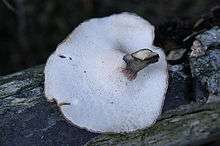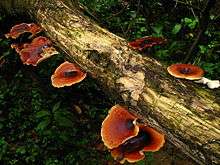Royoporus badius
| ||||||||||||||||||||||||||||||||
Royoporus badius, commonly known as the black-footed polypore or black-leg, is a species of fungus in the family Polyporaceae. It causes a white rot of hardwoods and conifers. The species is found in temperate areas of Asia, Australia, Europe, and North America. It has a dark brown or reddish-brown cap that reaches a diameter of 25 cm (9.8 in), and a stipe that is often completely black or brown at the top and black at the base.
Taxonomy
The species was first described in the scientific literature in 1801 by Christian Hendrik Persoon, who named it Boletus badius.[2] American mycologist Lewis David de Schweinitz transferred the species to Polyporus in 1832, and it was known by this name until 1997, when De transferred the species into the genus Royoporus,[3] which he had described the year before.[4] Polyporaceae species that are closely phylogenetically related to R. badius include P. dictyopus, P. melanopus, and P. tubaeformis, which have clamp connections on generative hyphae and a similar ecology.[5]
The specific epithet badius derives from the Latin root badi-, meaning "reddish brown".[6] The common names "black-footed polypore"[7] and "black-leg" refer to its characteristic dark-colored stipe.[6]
Description

The fruit bodies of Royoporus badius tend to be upright, growing solitary or in groups, sometimes with two or more fruit bodies arising from a common stipe. The cap is circular or kidney-shaped, and often lobed or with a wavy edge.
When young, the fruit bodies are convex, then become flat or funnel-shaped in maturity, reaching dimensions of 5–25 cm (2.0–9.8 in) across by 1–4 mm (0.04–0.16 in) thick. The upper cap surface is smooth and glossy, but develops radial wrinkles as it ages. The color of the cap is brown, often darker in the center and lighter-colored at the margins. The under-surface is white or cream-colored, yellowing when old. Pores are round and number 6–8 per mm, with decurrent tubes (running down the length of the stipe). The stipe, attached to the cap either centrally or laterally, is 2–8 cm (0.8–3.1 in) long by 0.5–1.5 cm (0.2–0.6 in) thick, velvety and dark brown to blackish-brown, black and longitudinally wrinkled when old.[8] Fruit bodies are inedible because of their tough texture.[6]
The spores are ellipsoid or cylindrical, hyaline (translucent), smooth, and 7.5–9 by 3–5 µm. The basidia (spore-bearing cells) are club-shaped with a narrow base, and have dimensions of 20–30 by 7–9 µm. Like other members of the genus Polyporus, this species has a dimitic hyphal construction, meaning that the hyphae are made of both generative hyphae and skeleto-ligative hyphae, a feature which tends to make the mushroom tissue hard and woody. There are no cystidia in the hymenium.[9] The fungus has been shown to produce asexual spores when grown in pure culture conditions.[10]
Habitat and distribution
Royoporus badius is a saprobic species, and causes white rot.[11] It grows on the standing or fallen trunks and branches of various hardwood genera, including Acer, Aesculus, Alnus, Betula, Castanea, Fagus, Fraxinus, Populus, Prunus, Robinia, Quercus, Salix, Tilia and Ulmus. The fungus grows in temperate regions of Asia, Europe, and North America.[9]
References
- ↑ "Royoporus badius (Pers.) A.B. De 1997". MycoBank. International Mycological Association. Retrieved 2012-10-18.
- ↑ Persoon CH. (1801). Synopsis Methodica Fungorum (in Latin). Gottingen, Sweden: Apud H. Dieterich. p. 523.
- ↑ De AB. (1997). "Taxonomy of Royoporus badius comb. nov". Mycotaxon 65: 469–74.
- ↑ De AB. (1996). "Royoporus – a new genus for Favolus spathulatus". Mycotaxon 60: 143–8.
- ↑ Sotome K, Hattori T, Ota Y. (2011). "Taxonomic study on a threatened polypore, Polyporus pseudobetulinus, and a morphologically similar species, P. subvarius". Mycoscience 52 (5): 319–26. doi:10.1007/s10267-011-0111-x.
- 1 2 3 Arora D. (1986). Mushrooms Demystified: A Comprehensive Guide to the Fleshy Fungi. Berkeley, California: Ten Speed Press. pp. 562, 903. ISBN 0-89815-169-4.
- ↑ Tylukti EE. (1987). Mushrooms of Idaho and the Pacific Northwest. Vol. 2 Non-gilled Hymenomycetes. Moscow, Idaho: The University of Idaho Press. pp. 199–200. ISBN 0-89301-097-9.
- ↑ Ellis JB, Ellis MB. (1990). Fungi without Gills (Hymenomycetes and Gasteromycetes): An Identification Handbook. London, UK: Chapman and Hall. p. 156. ISBN 0412369702.
- 1 2 Ryvarden L. (1993). European Polypores (Part 2 European Polypores). Oslo, Norway: Lubrecht & Cramer. pp. 561–2. ISBN 8290724128.
- ↑ Ingold CT. (1987). "Asexual spores of Polyporus squamosus and P. badius". Transactions of the British Mycological Society 87 (4): 613–6. doi:10.1016/s0007-1536(86)80101-2.
- ↑ Kuo M. (November 2004). "Polyporus badius". MushroomExpert.com. Retrieved 2012-10-18.

